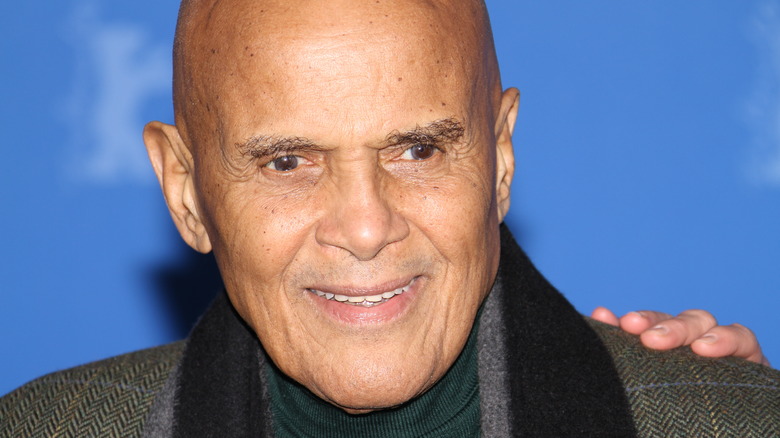Harry Belafonte's Cause Of Death Explained
Harry Belafonte, the activist, actor, and singer, died of congestive heart failure at his Manhattan home on Tuesday. Belafonte was 96.
Belafonte brought his Caribbean roots to his hit songs such as "Day-O (the Banana Boat Song)" and "Jamaica Farewell." His charm and good looks led him to become the highest-paid Black performer by 1959, and he went on to find success in Hollywood as well. Belafonte also used his platform to promote civil rights, including providing funding that launched the Student Nonviolent Coordinating Committee. A longtime friend and advocate for Rev. Dr. Martin Luther King, Jr., Belafonte ensured financial stability for Dr. King's family after his assassination (via The New York Times).
Belafonte continued his work as an activist, criticizing apartheid in South Africa while rebuking American presidents for their lack of action in world conflict, according to The Washington Post. He spearheaded the efforts to raise millions of dollars for medicine and food to Sudan and Ethiopia by pulling artists like Lionel Richie and Michael Jackson into the ensemble song "We Are the World."
Belafonte is survived by his wife Pamela Frank and his four children, Adrienne Biesemeyer, David, Gina, and actress Shari Belafonte.
What is congestive heart failure
Congestive heart failure doesn't mean the heart stops working. According to Johns Hopkins Medicine, congestive heart failure is a condition where the heart doesn't work efficiently to provide enough blood to the body. As a result, blood doesn't circulate properly, leading to a buildup of fluid in the lungs, abdomen, and other parts of the body. The heart will beat faster, and it will grow larger to try to compensate for the reduced blood circulation. Someone with congestive heart failure will also experience shortness of breath because the lungs fill with fluid. Kidney failure might also occur because not enough blood to the kidneys will cause them to retain too much water and sodium.
Symptoms of congestive heart failure may also include fatigue, swelling in the legs and ankles, heart palpitations, a hacking cough, or chest pain. People with congestive heart failure might not have symptoms at first, but the condition gets progressively worse with time, according to the Cleveland Clinic. High blood pressure, smoking, alcohol, diabetes, or congenital heart disease are some causes of congestive heart failure.
Treatment for congestive heart failure depends on the stages of the condition. The first stage will include regular exercise, abstaining from smoking and alcohol, and treating high blood pressure and cholesterol. As congestive heart failure advances, people might need to take beta-blockers, medications to slow heart rate, or diuretics to prevent fluid retention. Later stages of congestive heart failure might require surgery or a heart transplant.


